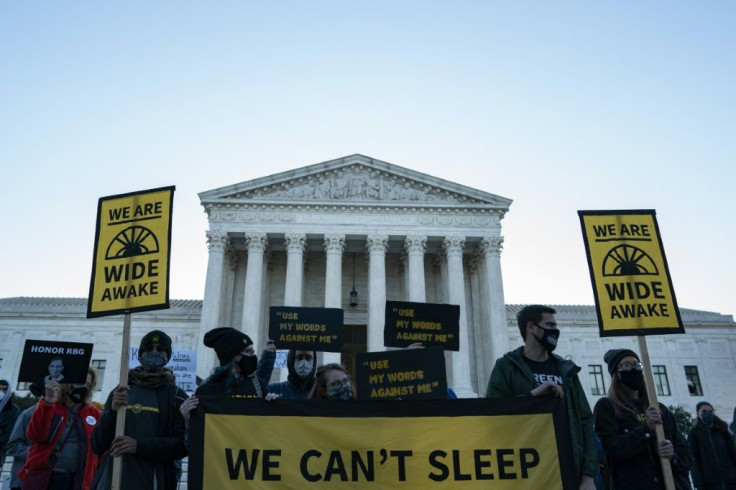Who is Amy Coney Barrett? Dogma, Faith Mark SCOTUS Nominee Favorite's Career
KEY POINTS
- Judge Amy Coney Barrett is the current favorite to fill the seat of the late Justice Ruth Bader Ginsburg. Trump has said he will wait to announce his list until later this week but will pick a woman
- Barrett is lauded in Republican circles for her conservative positions against the Affordable Care Act and abortion
- She has connections to a small religious group that preaches patriarchal family structure and asks members for lifetime loyalty oaths
In the wake of Justice Ruth Bader Ginsburg’s death, federal judge Amy Coney Barrett has emerged as a frontrunner for the seat. Her conservative stances and dedication to “dogma” have caused concern among some Democrats.
President Donald Trump told Fox he would wait until after Justice Ginsburg’s services later this week to announce his nominee, which he has assured supporters would be a woman.
Barrett sits on the 7th U.S. Circuit Court of Appeals. She emerged as a potential Supreme Court justice before, when Justice Antonin Scalia’s seat was being filled. At the time, Axios reported that Trump had said he was “saving” Barrett to fill Ginsburg’s seat.
Barrett is young – only 48 – and religious, a devout Catholic. Her stances against abortion and the Affordable Care Act endear her to conservatives, who have long sought to gain a firmer hold over the courts. Barrett has been a member of the Federalist Society, a group that seeks to expand conservative influence in the courts.
She is also an originalist, meaning that she believes the original meaning of the Constitution as written in 1787 should be applied as closely as possible to today’s world.

The New York Times reported in 2017 that Barrett was a member of the religious group People of Praise, although she declined to list any religious affiliation on the questionnaire she submitted during the judicial selection process. The religious group practices patriarchal family leadership, has its members swear lifetime loyalty oaths, and exercises heavy influence over their lives.
Craig Lent, a leader within People of Praise and professor at Notre Dame, would not confirm or deny Barrett’s membership. He told the New York Times that members hold a wide spectrum of views and the group “doesn’t try to control people.” Lent later added that any members holding public office would not be influenced by their religious leaders.
Barrett was, however, a trustee of the Trinity School, which was founded and is managed by People of Praise. Trustees must be members of the group. Barrett also noted that she gave a commencement speech but declined to submit a transcript during judicial selection as would be customary. Mentions of Barrett and her husband recently disappeared from People of Praise publications.
Her affiliation to the group was not revealed before her original confirmation hearing, and the fact that she didn’t bring it up raised questions about her forthrightness. M. Cathleen Kaveny, a professor for Boston College Law School, said that much less significant ties must be brought up during the process.
“I’m concerned that this was not sufficiently transparent,” she told the New York Times, “We have to disclose everything from the Elks Club to the alumni associations we belong to — why didn’t she disclose this?”
Even without her connection to People of Praise, Barrett’s religious zeal raised eyebrows. Sen. Dianne Feinstein, D-Calif., said during Barrett's previous confirmation hearing: “The dogma lives loudly within you. And that’s of concern when you come to big issues that large numbers of people have fought for for years in this country.”
Barrett gave a standard response, saying, “I’m being considered for a position on a court of appeals, and there would be no opportunity to be a ‘no’ vote on Roe, and as I said to the committee I would faithfully apply all Supreme Court precedent.”
Feinstein was skeptical when that was said by the other nominee moments before: “Do you know, for almost a quarter of a century, every single person before us has said they would be bound by precedent. I remember, when Senator Specter was chairman, ‘oh that’s super precedent’ someone that went on the Supreme Court said. And then got there and voted the other way.”
© Copyright IBTimes 2024. All rights reserved.




















